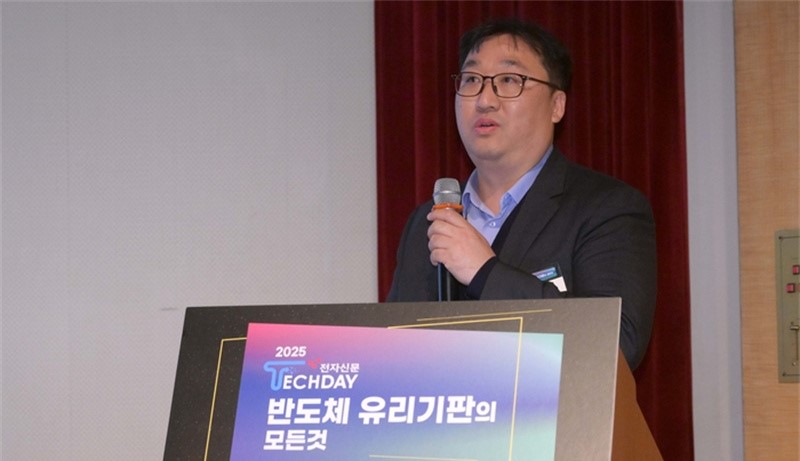South Korea's leading materials company, YCChem (112290.KQ), has announced a significant breakthrough in its development of photoresist (PR) for semiconductor glass substrates. PR, a light-sensitive liquid that changes properties upon exposure to light, is crucial for circuit formation in semiconductor manufacturing. The company has successfully developed a PR optimized for glass substrates, which have unique characteristics that differ from traditional substrates in terms of coating methods and dispersion properties.
At the "Electronic Times Tech Day: All About Semiconductor Glass Substrates" conference on April 16, YCChem's executive director, Yongil Kim, revealed that the company's high-transparency chemical amplification PR is highly suitable for glass substrates. This development positions YCChem to tap into the rapidly growing semiconductor glass substrate market.
Founded in 2001, YCChem has been supplying PR for semiconductor applications and is now pioneering new developments for the glass substrate sector. PRs are categorized into chemical amplification and dissolution inhibition types. Glass substrates require thicker coating films with high transparency, making the chemical amplification PR the ideal choice.
Initially, YCChem began developing dissolution inhibition PR but encountered challenges related to poor transparency, which hindered pattern formation and adhesion. Switching to chemical amplification PR, YCChem found that this technology is better suited to creating vertical plating structures on glass substrates, allowing for uniform electron flow and providing advantages in controlling PR thickness and precision—key for fine circuit patterning.
YCChem emphasizes that its proprietary chemical amplification PR outperforms competitors' products in terms of performance. According to Kim, YCChem's PR offers superior adhesion to glass substrates, leading to at least a 20% improvement in yield for metal wiring processes compared to rival products. Additionally, the energy required for the PR to react is approximately 50% lower than that of competitors, enabling faster processing and improved productivity.

Looking ahead, YCChem plans to tackle the challenge of metal wiring miniaturization, which is essential for the application of advanced semiconductors. Currently, the line and space sizes of metal wiring are at 2 micrometers (µm), but the company aims to shrink these down to 1µm. To achieve this, YCChem is collaborating with global exposure equipment manufacturers to develop a 1µm PR.
In addition to the PR development, YCChem is also working on other key materials, including stripping and developing solutions, to address the evolving needs of next-generation substrate materials.
On April 17, YCCheml's stock rose by 4.27% to 22,000 KRW, reflecting investor confidence following the announcement of its advanced PR development. This surge comes as the company is poised to tap into the growing semiconductor glass substrate market, with global giants accelerating their investments in this area.
Market research firm MarketsandMarkets projects that the global glass substrate market will expand from $7.1 billion (about KRW 10.0607 trillion) in 2023 to $8.4 billion (about KRW 11.902 trillion) by 2028, reflecting an 18% growth. Meanwhile, research agency Yole forecasts that the advanced substrate market, fueled by developments in glass substrates, could reach $25.53 billion (about KRW 36.1735 trillion) by 2029.
As AI-driven demand and semiconductor innovation continue to grow, YCChem's breakthrough positions the company as a key player in the next-generation substrate materials market, with expectations of capturing a share of the multi-trillion-dollar semiconductor industry.
Editor’s Note:
Although this article focuses on semiconductor applications, YCChem's glass substrate photoresist technology is equally relevant to the development of high-frequency PCBs, especially in the realms of 5G millimeter-wave and advanced packaging.
+86 191 9627 2716
+86 181 7379 0595
8:30 a.m. to 5:30 p.m., Monday to Friday
